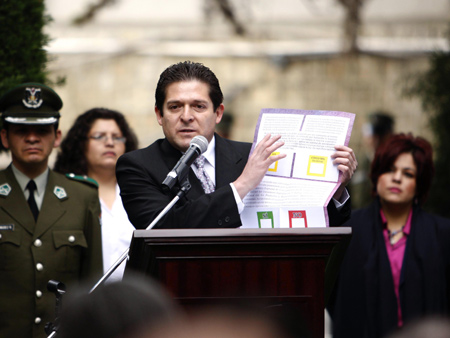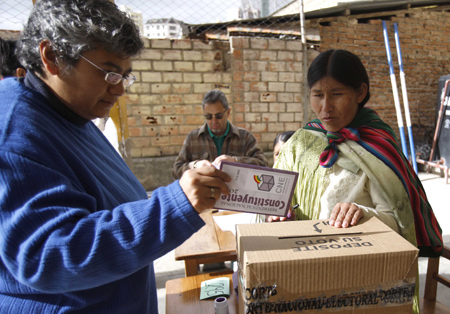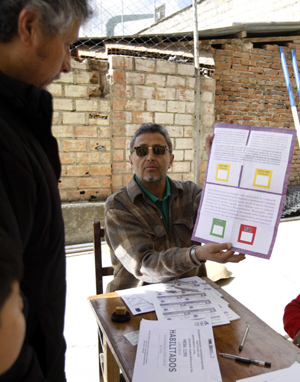|

|
|
Jose Luis Exeni, president of Bolivian National Electoral Court (CNE), declares the official start of the referendum on the new constitution in La Paz, Bolivia, Jan. 25, 2009. A referendum called by Bolivian President Evo Morales on ratification of his constitutional reform kicked off on Jan. 25. [Xinhua/Bao Feifei] |
Bolivians went to the polls on Sunday to vote on a new constitution which would give more power to the country's indigenous majority, promote reform on agricultural land and allow President Evo Morales to seek re-election for another term.
Polls showed the highest support for Morales was from people in the western highlands where Indians are a majority, while people from other races and classes would probably reject the charter, according to news reports from La Paz, Bolivia's administrative capital.
|

|
|
A Bolivian woman casts her ballot of the referendum on the new constitution in La Paz, Bolivia, Jan. 25, 2009. [Xinhua/Bao Feifei] |
The new Bolivian Constitution aims to give everybody the same opportunities, the same rights and the same duties, said Morales, the country's first Indian president who took office in 2006.
Under the new constitution, the indigenous majority in the South American nation will gain greater political power and benefit more from the vital natural gas industry.
The new constitution proposes limiting land holding to 5,000 hectares or 10,000 hectares, which was fiercely opposed by the landholders in the eastern region. It would also boost indigenous rights by recognizing the rights of 36 indigenous groups to control their land and claim more rights on natural resources.
|

|
|
?A Bolivian man casts his ballot of the referendum on the new constitution in La Paz, capital of Bolivia, Jan. 25, 2009. [Xinhua/Bao Feifei] |
Morales lauded the constitution as the cornerstone of his agenda to improve the balance of power in favor of Bolivian Indians.
If approved, a general election is expected in December in which Morales could run for a second five-year term.
Should the constitution pass, Bolivia's smaller indigenous groups will gain seats in the congress which would result in debates on how to split power between the Indian and eastern-states' autonomies.
(Xinhua News Agency January 26, 2009)